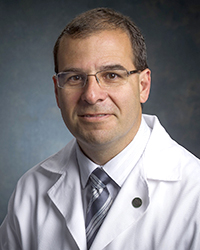by Eduardo Mulanovich, PGY-1
I sat down with Dr. Martin Rodriguez, UAB Internal Medicine alumnus and current director of the resident Global Health Track, to discuss the role that global health has played in his career and in the developing careers of many UAB residents.
Why Global Health?
 Martin Rodriguez, MDThe interest in caring for underserved populations has always been strong in a large number of medical workers and trainees. With increasing globalization, communication, and transportation options, it is not surprising to see that more and more medical students and residents are highly interested in educational, humanitarian, clinical, and cultural experiences abroad. Our Global Health track offers our residents the possibility of having such experiences during their training.
Martin Rodriguez, MDThe interest in caring for underserved populations has always been strong in a large number of medical workers and trainees. With increasing globalization, communication, and transportation options, it is not surprising to see that more and more medical students and residents are highly interested in educational, humanitarian, clinical, and cultural experiences abroad. Our Global Health track offers our residents the possibility of having such experiences during their training.
Why do you believe residents would benefit from global health experiences?
The benefits from these experiences are many, from personal growth and cultural expansion, to medical knowledge and clinical experience. Studies have reported that those who participate in international educational activities during their medical training report becoming better physicians in terms of improved physical exam skills, becoming more cost conscious, and showing greater commitment to underserved populations. It appears that these activities may inspire a dedication to further global health work and service to impoverished populations domestically.
What do you feel are some of the expected and unexpected benefits and experiences that residents have shared from participating in the Global Health track?
Most of our residents on the Global Health track have had previous experiences in international work; however many times this work was limited to brief mission trips or experiences when there was a limit to what they could do in terms of patient care. Having the opportunity of spending 1-2 months abroad in a more active role as a resident physician has allowed them to expand their horizons in many different ways. Many of them have shown persistent commitment to international work and are already participating in a number of projects in developing countries, or plan to do so in the future. Many have made a decision to keep going back to these countries in the future to continue to provide much needed help.
What are some of the places residents have gone to?
Our residents have gone to a variety of places. In the last 4 years they have gone to Cameroon, Honduras, India, Jordan, Kenya, Panama, Peru, and Zambia. One of the specific activities the Global Health track offers is participation in the Gorgas Course, which takes place every year in Peru, and is considered the top course for training in tropical medicine in the world. Other frequent destinations have been Honduras and Zambia.
What kind of support is offered to residents going on these trips?
Residents who go on trips as part of the GH track receive financial support to cover expenses related to the trip, included but not limited to airline tickets, housing, health insurance, pre-travel consultation, prophylactic medications, and vaccinations. For the one resident per year chosen to attend the Gorgas course this includes one month of salary support and tuition for the course.
Having graduated from la Universidad Peruana Cayetano Heredia - where the Gorgas course takes place - how does it compare to your experience as a former medical student at Cayetano?
As a medical student I was exposed to excellent pathology and teachers, however, the structure and organization of the Gorgas course was not there. I believe Gorgas offers a unique opportunity because of the effort the faculty – Peruvian, UAB, international – puts into the daily activities, the variety of pathology, and the learning environment. Being able to interact with people from all over the world and share experiences, the amount of time spent with highly engaged and excellent faculty, and the fascinating cases you get to see explain why this course has been so successful and popular.
How and when should a resident apply? What is offered throughout the year?
We have ongoing periodic meetings when we discuss topics related to Global Health. These meetings are open to anyone in our residency program. If they decide to formally participate in the Global Health track, they are asked to apply in Dec/Jan of each academic year when they are a PGY-2 for Internal Medicine or PGY-2-3 for Med/Peds. They can also request exposure to pertinent clinics during their block month, such as Travelers Health Clinic, the 1917 HIV Clinic, and Tuberculosis Clinic, among others.
What Global Health trips do you personally take?
I go to Peru to teach during the Gorgas course on a yearly basis. It is always a fascinating experience.
Of the places you have traveled, which has the best cuisine?
Of course Peruvian! Other cuisines are not even close.